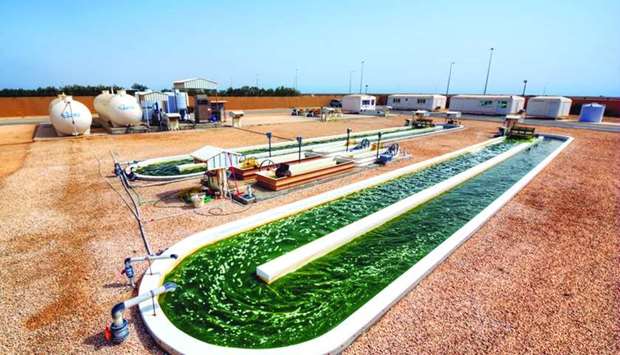The Sustainable Development Centre (SDC) at Qatar University’s College of Arts and Sciences (QU-CAS) is now developing the techniques to produce bio-crude oil through its Qatar Biofuel Project, it was announced Monday.
QU had revealed the one-of-its-kind project in the region during the United Nations Climate Change Conference (COP18) in 2012 in Doha aimed at finding a way to produce affordable and sustainable biofuels.
"Production of biofuels can also be done efficiently under searing temperatures and without relying on Qatar’s arable land," said SDC director and Qatar Biofuel Project manager Hareb al-Jabri.
In a statement, he said the first phase of the project witnessed SDC’s research team producing three types of biofuels: biodiesel, bioethanol and bio-crude oil.
These fuels should provide an additive source of energy, specifically for use by the airline industry, al-Jabri pointed out.

“If successfully produced on a commercial scale, the discovery will have international ramifications – significantly reducing one of the airline industry’s biggest fixed costs and providing a sustainable, environmentally-friendly fuel where carbon dioxide is recycled rather than accumulating in the atmosphere,” he said.
Al-Jabri stressed that the SDC team studied the economic feasibility of each type of biofuel to specify which one aligns with the project’s aim at the start of the project’s second phase.
“The team started with conducting the techno economic analysis for the production of each type of biofuel in line with the resources available and the existing infrastructure of oil and gas sector,” he said.
“At the end of the analytical study, we converted the overall biomass into bio-crude oil and then separated its components using the available refinery systems,” he explained. “We are currently developing the techniques of the production process while considering the volume and the quality of the product.”

The first phase of the project produced three types of biofuels: biodiesel, bioethanol and bio-crude oil
Al-Jabri said this project adds value to the country’s oil and gas sector as it aims to support the vision of Qatar Airways to use environmentally-friendly fuel in the airline industry, reducing the negative environmental effects of conventional fuel.
He added that the project will also contribute to carbon dioxide sequestration by recycling it to produce biofuels.
In addition, al-Jabri said the project aims to invest in Qatar’s natural resources to create products that will contribute to economic diversification, in line with the goals of Qatar National Vision 2030 and the national aspirations towards a knowledge-based economy.
About the role of CAS students in such research projects, al-Jabri said SDC welcomes students from various colleges across QU, assisting and supporting them in implementing their graduation projects at the undergraduate and graduate levels.
“The students have the opportunity to contribute to the Centre’s research projects. Such opportunities help them enhance their knowledge and gain an in-depth experience in the field of research,” he pointed out.
About the national efforts towards diversifying energy resources, al-Jabri stressed that Qatar made huge efforts in the diversification of renewable energy resources.
“These efforts are highlighted in the Qatar National Strategy which started in 2011, which focuses on the importance of supporting research projects related to the development of technologies for renewable energy, as well as to drive collaboration efforts with various local and regional institutions to produce renewable energy,” he explained.
About the Centre’s new projects, al-Jabri said they are now focusing on various applicable research projects aimed at providing solutions for the challenges that Qatar is facing in different areas such as environment, food and water security, health, and energy, among others.
“In this regard, the transfer of the results from research and development level into implementation level is a crucial part of the center’s strategy. Hence, we are currently building a new demo plant at the north of Qatar for the production of food, fuel and health products,” he added.


